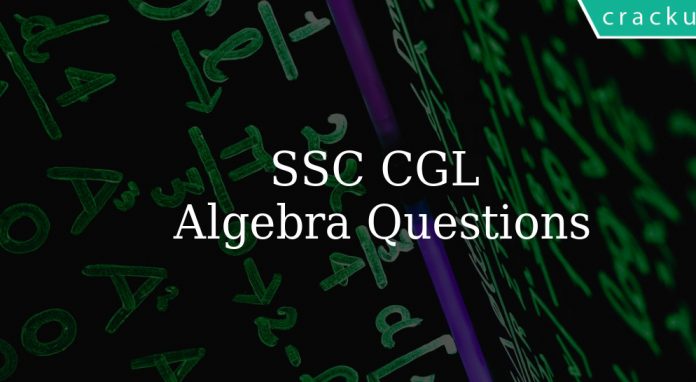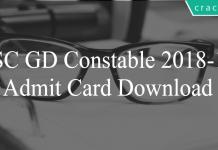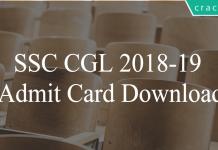SSC CGL Algebra Questions
Download the most important practice questions on algebra for SSC CGL exam 2020. Most important SSC CGL practice questions based on asked questions in previous exam papers for SSC CGL. These questions with solutions are also helpful for all competitive exams.
Download SSC CGL Algebra questions
Get 125 SSC CGL Mocks – Just Rs. 199
Take a free SSC CGL Tier-1 mock test
Download SSC CGL Tier-1 Previous Papers PDF
Question 1: If $x^{2}+\frac{1}{5}x+a^{2}$ is a perfect square then a is
a) $\frac{1}{100}$
b) $\frac{1}{5}$
c) $\frac{1}{10}$
d) 10
Question 2: Given that $1^{2}+2^{2}+3^{2}+…..+10^{2}=385$ the value of $2^{2}+4^{2}+6^{2}+….20^{2}=$
a) 770
b) 1540
c) 1155
d) (385)
Question 3: If ab + bc+ ca = 0, then the value of $\frac{1}{a^2-bc}+\frac{1}{b^2-ac}+\frac{1}{c^2-ab}$
a) 2
b) -1
c) 0
d) 1
Question 4: If the equation $2x^{2}-7x+12=0$ has two roots $\alpha$ and $\beta$ then the value of $\frac{\alpha}{\beta}$+$\frac{\beta}{\alpha}$ is
a) $\frac{7}{2}$
b) $\frac{1}{24}$
c) $\frac{7}{24}$
d) $\frac{97}{24}$
Question 5: Find the value of x for which the expression $2 – 3x- 4x^{2}$ has the greatest value.
a) $-\frac{41}{16}$
b) $\frac{3}{8}$
c) $-\frac{3}{8}$
d) $\frac{41}{16}$
Question 6: The expression $x^4- 2x^2 + k$ will be a perfect square if the value of k is
a) $1$
b) $0$
c) $\frac{1}{4}$
d) $\frac{1}{2}$
Question 7: If (x-1) and (x+3) are the factors of $x^{2}+k_{1}x + k_{2}$ then
a) $k_{1}=-2 ,k_{2}=-3$
b) $k_{1}=2 ,k_{2}=-3$
c) $k_{1}=2 ,k_{2}=3$
d) $k_{1}=-2 ,k_{2}=3$
Question 8: If $\frac{5x}{2x^2+5x+1}=\frac{1}{3}$ then the value of $(x+\frac{1}{2x})$ is
a) 15
b) 10
c) 20
d) 5
Question 9: If $x^{2}+\frac{1}{x^2}=66$ then the value of $\frac{x^2-1+2x}{x}=$ ?
a) ± 8
b) 10, – 6
c) 6, -10
d) ± 4
Question 10: If $a^{2} + a+ 1 = 0$, then the value of $a^{9}$ is
a) 2
b) 3
c) 1
d) 0
Join Exam Preparation Telegram Group
Question 11: Find the value of $\sqrt{(x^2+y^2+2)(x+y-32)}\div \sqrt{xy^3 2^2}$ when $x=+1,y=-3$
a) 1
b) 0
c) $\frac{34}{3}$
d) 2
Question 12: If a = 2 + √3 ,then the value of $(a^{2}+\frac{1}{a^{2}})$ is
a) 12
b) 14
c) 16
d) 10
e) Non of These
Question 13: If x + y = 15, then $(x-10)^{3}+(y-5)^{3}$ is
a) 25
b) 125
c) 625
d) 0
Question 14: If a + b = 6, a – b = 2, then the value of 2*(a^2 + b^2 ) is :
a) 20
b) 30
c) 40
d) 10
Question 15: The value of x when 5% of √2x is 0.01 will be :
a) 0.03
b) 0.02
c) 0.01
d) 0.05
Get 125 SSC CGL Mocks – Just Rs. 199
Question 16: If $\sqrt{\frac{x-a}{x-b}}+\frac{a}{x}=\sqrt{\frac{x-b}{x-a}}+\frac{b}{x}$ and $b \neq a$, then the value of $x$ is
a) $\frac{b}{a+b}$
b) $\frac{ab}{a+b}$
c) 1
d) $\frac{a}{a+b}$
Question 17: If $x = \frac{2\sqrt{24}}{\sqrt{3}+\sqrt{2}}$, then the value of $\frac{x+\sqrt{8}}{x-\sqrt{8}}+\frac{x+\sqrt{12}}{x-\sqrt{12}}$ is
a) 1
b) 2
c) 3
d) -2
Question 18: If $a=\frac{2+\sqrt{3}}{2-\sqrt{3}}$ and $b=\frac{2-\sqrt{3}}{2+\sqrt{3}}$, then the value of $a^2+b^2+a \times b$ is
a) 185
b) 195
c) 200
d) 175
Question 19: If $x = \frac{2\sqrt{6}}{\sqrt{3}+\sqrt{2}}$, then the value of $\frac{x+\sqrt{2}}{x-\sqrt{2}} + \frac{x+\sqrt{3}}{x-\sqrt{3}}$ is
a) $\sqrt{2}$
b) $\sqrt{3}$
c) $\sqrt{6}$
d) $2$
Question 20: If $\sqrt{4x-9}+\sqrt{4x+9}=5+\sqrt{7}$, then the value of $x$ is
a) 4
b) 5
c) 7
d) 3
More SSC CGL Important Questions and Answers PDF
Answers & Solutions:
1) Answer (C)
Expression : $x^{2}+\frac{1}{5}x+a^{2}$
= $[(x^2) + (2 * \frac{1}{10} * x) + (\frac{1}{10})^2] + a^2 – (\frac{1}{10})^2$
= $(x + \frac{1}{10})^2 + a^2 – (\frac{1}{10})^2$
Now, for the above expression to be perfect square,
=> $a^2 – (\frac{1}{10})^2 = 0$
=> $a^2 = (\frac{1}{10})^2$
=> $a = \frac{1}{10}$
2) Answer (B)
Given that $1^{2}+2^{2}+3^{2}+…..+10^{2}=385$
Now,
$2^{2}+4^{2}+6^{2}+….20^{2}=(1^{2}+2^{2}+3^{2}+…..+10^{2}) \times 2^2 = 4 \times 385 = 1540$
3) Answer (C)
Since, $ab + bc + ca = 0$
If we take $a = b = 1$, => $c = \frac{-1}{2}$
To find : $\frac{1}{a^2-bc}+\frac{1}{b^2-ac}+\frac{1}{c^2-ab}$
Substituting values of $a,b,c$ we get :
= $\frac{1}{1 – (\frac{-1}{2})} + \frac{1}{1 – (\frac{-1}{2})} + \frac{1}{(\frac{1}{4}) – 1}$
= $\frac{1}{\frac{3}{2}} + \frac{1}{\frac{3}{2}} + \frac{1}{\frac{-3}{4}}$
= $\frac{2}{3} + \frac{2}{3} – \frac{4}{3}$
= $\frac{4}{3} – \frac{4}{3} = 0$
4) Answer (B)
Equation : $2x^{2}-7x+12=0$
=> Sum of roots = $\alpha + \beta = \frac{7}{2}$
=> Product of roots = $\alpha \beta = \frac{12}{2} = 6$
To find : $\frac{\alpha}{\beta}$+$\frac{\beta}{\alpha}$
= $\frac{\alpha^2 + \beta^2}{\alpha \beta}$
= $\frac{(\alpha + \beta)^2 – 2 \alpha\beta}{\alpha \beta}$
= $\frac{\frac{49}{4} – 12}{6}$
= $\frac{\frac{1}{4}}{6} = \frac{1}{24}$
5) Answer (C)
NOTE :- To find the min/max value of an expression, we need to differentiate it, and put the first derivative equal to ‘0’ to find value of $x$
Then, we need to differentiate it again and put value of $x$, if second derivative is less than zero, then $x$ is maxima otherwise $x$ is minima.
Expression : $y$ = $2 – 3x- 4x^{2}$
=> $\frac{dy}{dx} = -3 – 8x$
Now, putting it equal to 0, we get :
=> $y’ = -3 -8x = 0$
=> $x = \frac{-3}{8}$
Differentiating it again :
=> $\frac{d^2y}{dx^2} = -8$
Since, it is less than ‘0’ ,=> $x = \frac{-3}{8}$ is maximum value.
6) Answer (A)
It is clear that we have to write the expression in the form $(a-b)^2$.
The second term in the given expression in $-2x^2$. This expression must correspond to the form 2ab. Hence, $a = x^2$ and $ b=1$.
Hence, k must be equal to 1 for the expression to be a perfect square.
Option A is the right answer.
7) Answer (B)
METHOD1:
If (x-1) and (x+3) are the factors of $x^{2}+k_{1}x + k_{2}$
then its zeros are 1, -3
sum of zeros = $-k_{1}=-2\rightarrow k_{1}=2$
product of zeros = $k_{2}=-3\rightarrow k_{2}=-3$
so the answer is option B.
METHOD2:
Multiply (x-1) and (x+3)
= $x^{2}-x+3x-3$
= $x^{2}+2x-3$
now, compare $x^{2}+2x-3$ with $x^{2}+k_{1}x + k_{2}$
$k_{1}=2$ and $k_{2}=-3$
so the answer is option B.
8) Answer (D)
Expression : $\frac{5x}{2x^2+5x+1}=\frac{1}{3}$
=> $2x^2 + 5x + 1 = 15x$
=> $2x^2 + 1 = 10x$
To find : $(x+\frac{1}{2x})$
= $\frac{2x^2 + 1}{2x}$
= $\frac{10x}{2x}$
= 5
9) Answer (B)
Expression : $x^{2}+\frac{1}{x^2}=66$
=> $(x – \frac{1}{x})^2 + 2 = 66$
=> $(x – \frac{1}{x})^2 = 64$
=> $x – \frac{1}{x} = \pm 8$
To find : $\frac{x^2-1+2x}{x}$
= $x – \frac{1}{x} + 2$
= $(8 + 2)$ and $(-8 + 2)$
= 10 and -6
10) Answer (C)
Expression : $a^{2} + a+ 1 = 0$
Multiplying both sides by $(a-1)$ , we get :
=> $(a-1)(a^2 + a + 1) = 0$
=> $a^3 – 1 = 0$
=> $a^3 = 1$
Cubing both sides
=> $a^9 = 1$
11) Answer (C)
we need to find value of $\sqrt{(x^2+y^2+2)(x+y-32)}\div \sqrt{xy^3 2^2}$ when $x=+1,y=-3$
putting value of x , y
$\sqrt{(1^2 + (-3)^2 + 2)\times(1 – 3 – 32)}\div \sqrt{1 \times (-3)^3 \times 4}$
= 34/3
12) Answer (B)
a = 2 + √3
$(a^{2}+\frac{1}{a^{2}})$ = $(a + \frac{1}{a})^2$ – 2
here ,
$a = 2+\sqrt{3}$
$\dfrac{1}{a} = \dfrac{1}{2+\sqrt{3}} \times\dfrac{2-\sqrt{3}}{2-\sqrt{3}} = 2-\sqrt{3}$
$a+\dfrac{1}{a} = 2+\sqrt{3} + 2-\sqrt{3}$
$a + \dfrac{1}{a} = 4$
So, $(a + \frac{1}{a})^2$ – 2 = 14
13) Answer (D)
given that x + y = 15
So reaaranging the above equation
(x -10 ) + (y-5) =0
Now , x-10 =-( y -5 )
On cubing both sides
$(x-10)^3$ =- $(y-5)^3$
And hence
$(x-10)^3$ + $(y-5)^3$ =0
14) Answer (C)
here we are given with
a + b = 6…….(1)
a – b = 2…(2)
adding both equations
2a = 8
a = 4
so b = 2
we need to calculate $2 \times (a^2 + b^2 ) = 2 \times (4^2 + 2^2) = 40$
15) Answer (B)
It is given that 5% of √2x is 0.01
$\frac{5}{100} \times \surd(2x)$ = 0.01
x = 0.02
Get 125 SSC CGL Mocks – Just Rs. 199
18000+ Questions – Free SSC Study Material
16) Answer (B)
17) Answer (B)
Given : $x = \frac{2\sqrt{24}}{\sqrt{3}+\sqrt{2}}$
=> $x = \frac{2\sqrt{24}}{\sqrt{3}+\sqrt{2}}\times(\frac{\sqrt3-\sqrt2}{\sqrt3-\sqrt2})$
=> $x=\frac{2\sqrt{24}(\sqrt3-\sqrt2)}{3-2}$
=> $x=2\sqrt{72}-2\sqrt{48}$
=> $x=6\sqrt8-4\sqrt{12}$ —————(i)
To find : $\frac{x+\sqrt{8}}{x-\sqrt{8}}+\frac{x+\sqrt{12}}{x-\sqrt{12}}$
= $\frac{6\sqrt8-4\sqrt{12}+\sqrt{8}}{6\sqrt8-4\sqrt{12}-\sqrt{8}} + \frac{6\sqrt8-4\sqrt{12}+\sqrt{12}}{6\sqrt8-4\sqrt{12}-\sqrt{12}}$ [Using (i)]
= $\frac{7\sqrt{8}-4\sqrt{12}}{5\sqrt{8}-4\sqrt{12}} + \frac{6\sqrt8-3\sqrt{12}}{6\sqrt8-5\sqrt{12}}$
= $\frac{(336-35\sqrt{96}-24\sqrt{96}+240)+(240-15\sqrt{96}-24\sqrt{96}+144)}{240-25\sqrt{96}-24\sqrt{96}+240}$
= $\frac{960-98\sqrt{96}}{480-49\sqrt{96}}$
= $\frac{2(480-49\sqrt6)}{480-49\sqrt6}=2$
=> Ans – (B)
18) Answer (B)
$a=\frac{2+\sqrt{3}}{2-\sqrt{3}}$ on rationalising we will get a = $(2 + \surd3)^2$
$b=\frac{2-\sqrt{3}}{2+\sqrt{3}}$ on rationalizing we will get b = $(2 – \surd3)^2$
now putting values of a and b in , $a^2+b^2+a \times b$
$a^2+b^2+a \times b$ = 195
19) Answer (D)
Given : $x = \frac{2\sqrt{6}}{\sqrt{3}+\sqrt{2}}$
=> $x = \frac{2\sqrt{6}}{\sqrt{3}+\sqrt{2}}\times(\frac{\sqrt3-\sqrt2}{\sqrt3-\sqrt2})$
=> $x=\frac{2\sqrt6(\sqrt3-\sqrt2)}{3-2}$
=> $x=2\sqrt{18}-2\sqrt{12}$
=> $x=6\sqrt2-4\sqrt3$ —————(i)
To find : $\frac{x+\sqrt{2}}{x-\sqrt{2}} + \frac{x+\sqrt{3}}{x-\sqrt{3}}$
= $\frac{6\sqrt2-4\sqrt3+\sqrt{2}}{6\sqrt2-4\sqrt3-\sqrt{2}} + \frac{6\sqrt2-4\sqrt3+\sqrt{3}}{6\sqrt2-4\sqrt3-\sqrt{3}}$ [Using (i)]
= $\frac{7\sqrt{2}-4\sqrt3}{5\sqrt{2}-4\sqrt3} + \frac{6\sqrt2-3\sqrt{3}}{6\sqrt2-5\sqrt{3}}$
= $\frac{(84-35\sqrt6-24\sqrt6+60)+(60-15\sqrt6-24\sqrt6+36)}{60-25\sqrt6-24\sqrt6+60}$
= $\frac{240-98\sqrt6}{120-49\sqrt6}$
= $\frac{2(120-49\sqrt6)}{120-49\sqrt6}=2$
=> Ans – (D)
20) Answer (A)
given that
$\sqrt{4x-9}+\sqrt{4x+9}=5+\sqrt{7}$
$\sqrt{4x-9} – 5 = \sqrt{7} – \sqrt{4x+9}$
on squaring both sides
4x – 9 + 25 + 10$\sqrt{4x+9}$ = 7 + 4x + 9 – 2$\sqrt{28x+63}$
10$\sqrt{4x-9}$ = 2$\sqrt{28x+63}$
on squaring both sides again
400x – 900 = 112x + 252
288x = 1152
x = 4





